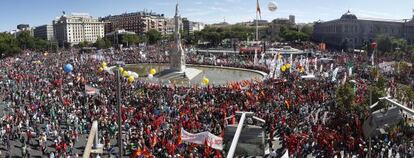Thousands demand referendum be held to determine austerity drive
Demonstrators converge in Madrid Unions ponder euro-wide protest

Hundreds of thousands of Spaniards from different parts of the country converged in Madrid on Saturday to demand a referendum to determine whether the government should continue on its severe austerity program. Brought together by a collective called Social Summit — comprised of about 200 professional organizations and the unions — demonstrators marched through the streets of the Spanish capital under thousands of flags, banners and signs of the groups that they represented.
Many carried placards with the words “Fed up,” “Euro violence,” and “Assault” written on them.
Saturday’s protest is just the first of many that are due to be held by the UGT and CCOO unions during what is expected a heated social conflict period this autumn. Both labor groups have threatened to call a general strike in the future.
The demonstration came just four days after a massive turnout in Catalonia of pro-nationalist supporters who demanded independence as an alternative to the central government's cutbacks.
The prime minister has the key to stop this general strike”
But the Popular Party (PP) administration of Prime Minister Mariano Rajoy has said that it won’t give in. “Sacrifices are absolutely unavoidable,” said Economy Minister Luis de Guindos.
In fact, government officials appeared relieved because they expected Saturday’s protest to be bigger than it actually was. “The majority of the citizens are supporting the reforms,” said one official.
Organizers did not release any official figures to show how many people had participated on Saturday but some were calling it an “historical,” “transcendental” and “formidable” turnout. Later, sources in the organizing committees said there were about 500,000. But the government’s delegate in Madrid put the figure as low as 65,000.
EL PAÍS did not calculate the number of protestors but determined that the space filled in the square as well as the adjacent streets (Génova, Recoletos, Castellana and Goya) comprise about 70,000 square meters.
I had to leave my job as a music teacher to care for my son”
Members of the opposition Socialist Party also took part in the march, which culminated in a large manifestation in Colón Plaza. Although neither secretary general Alfredo Pérez Rubalcaba nor the party’s number two Elena Valenciano were present, other top Socialists marched alongside a banner that read: “They want to ruin this country. We must stop them.”
“Citizens are saying ‘no’ to nine months of cutbacks and lies,” said Óscar López, the party’s organization secretary.
Various speakers insisted that this was only the beginning of a series of protests and mass concentrations.
“The prime minister has the key to stop this general strike,” said CCOO secretary general Ignacio Fernández Toxo. Many began chanting: “Rajoy, resign, new elections now!”
Cándido Méndez, secretary general of the UGT, added: “If the government doesn’t pay attention to us, we will come up with another answer or mobilization.”
Later, the two union leaders explained that they are contemplating calling for a European-wide protest with other labor unions across the continent to protest the policies of the bloc’s leaders. Méndez and Toxo have called their European counterparts to a meeting in Madrid on September 25 to discuss the matter.
“This is the first time I have participated in a demonstration,” said Hipolit Agulló of Alicante. “I have a son who suffers from cerebral palsy and they have cutback his caregiver’s aid by 15 percent, and the government has cutoff the social security we received for caring for him. I had to leave my job as a music teacher to care for him.”
José Planas, a fireman from the Aragon region, was one of thousands of firefighters who took part in the march. Firefighters have been heavily affected by the cutbacks. “We are supposed to rescue people, not the banks,” Planas said in reference to the drop in government funding. “They should be asking for money to those who have it, raise taxes on the rich and not on the worker.”
Tu suscripción se está usando en otro dispositivo
¿Quieres añadir otro usuario a tu suscripción?
Si continúas leyendo en este dispositivo, no se podrá leer en el otro.
FlechaTu suscripción se está usando en otro dispositivo y solo puedes acceder a EL PAÍS desde un dispositivo a la vez.
Si quieres compartir tu cuenta, cambia tu suscripción a la modalidad Premium, así podrás añadir otro usuario. Cada uno accederá con su propia cuenta de email, lo que os permitirá personalizar vuestra experiencia en EL PAÍS.
¿Tienes una suscripción de empresa? Accede aquí para contratar más cuentas.
En el caso de no saber quién está usando tu cuenta, te recomendamos cambiar tu contraseña aquí.
Si decides continuar compartiendo tu cuenta, este mensaje se mostrará en tu dispositivo y en el de la otra persona que está usando tu cuenta de forma indefinida, afectando a tu experiencia de lectura. Puedes consultar aquí los términos y condiciones de la suscripción digital.








































